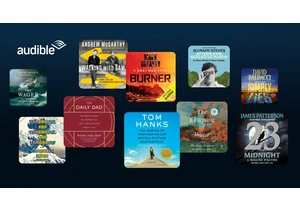Kobo, a Rakuten subsidiary that sells ebooks and ereaders, has built its name on being a more open and author-friendly version of Amazon Kindle. However, a recent change to the company's self-publishing business has some writers worried that reputation might change. Last month, the company updated its Terms of Service for Kobo Writing Life, its publishing platform, which opened the door to AI features on the platform. With that new contract language going into effect on June 28th, authors seem no clearer on what it will mean for their futures on Kobo.
For authors who haven't broken into (or have opted out of) traditional publishing both Kobo Writing Life and Kindle Direct Publishing offer a way to sell books without needing representation or a publishing deal. If they can provide their work and the information needed to make a store page — and have a willingness to serve as not only author but marketer — they have everything they need to sell their books.
Agreeing to sell on one of these platforms comes with a list of conditions. The biggest is the split of sales. If an author sells their novel for $2.99 or more on Kobo Writing Life, they keep 70 percent of what they earn. On the considerably larger Kindle Direct Publishing platform, there are two royalty options — 35 percent and 70 percent — but both have a confusing litany of compounding factors, some of which can significantly reduce authors' earnings. The calculus of fees vs. exposure makes authors develop strong preferences for the platform they choose. But the terms of service under which their work is published are also important — and apparently subject to change with little warning.
Engadget spoke with three authors who were surprised by Kobo's decision to experiment with AI. All of them noticed the company had published new Terms of Service because of a simple banner notification in the Kobo Writing Life Dashboard. Even now, a month after the terms were changed, the company is unable to clarify how the new terms would apply to existing work. There also isn't a means for authors to opt out. If anyone on Kobo is adamantly against any amount of AI use, their best and only option is to stop publishing there, and probably to pull their existing work from the platform.
The authors we spoke to were surprised that Kobo didn't reach out about the proposed changes in advance, but also that the company was choosing to work with AI at all. "I appreciate their transparency in being candid about their use of AI," Michelle Manus, a fantasy author on Kobo's platform, wrote to Engadget over email. "What I think they vastly underestimated was the extent to which their user base dislikes AI."
Kobo's new terms are explicit in saying that the company does not plan to use authors' work to train generative AI. It does, however, reserve the right to use "artificial intelligence, machine learning, deep learning algorithms or similar technologies" to "read, analyze, and process" writing for a variety of non-training purposes, including:
"Enhancing the discoverability of Works" with tagging and targeted customer recommendations
"Evaluating the suitability of Works" for sale in the Kobo store
"Generating resources" like "creating keywords, promotional content, targeted advertisements, customer engagement strategies and other materials"
"Providing recaps, reading assistance and accessibility features"
Authors have taken issue with the apparent lack of recourse provided to them. What happens if a work is incorrectly tagged as one genre when its author believes it more directly fits another? Or what if the "promotional material" Kobo generates includes some kind of hallucination? The biggest issue for the writers Engadget spoke to was the potential for Kobo to deploy AI-generated recaps. Amazon implemented a recap tool on Kindle in April, using generative AI to help readers get back into a series or remember where they were in a novel, and some authors have already found examples of the company's AI inaccurately summarizing stories.
"We would have immediately gone, 'Ah, okay, we see what you're trying to do, but we don't think that the thing you're suggesting is going to work to address the problem that you're trying to address," Delilah Waan, a fantasy author and YouTube creator, told Engadget. Since self-published authors tend to be more responsive to their audience, these kinds of issues could actually jeopardize that relationship. "Authors frequently get pushback from readers about plot choices, and I can only imagine the levels to which that could rise if they are receiving incorrect recaps of what happened in a book," Manus wrote.
All of the authors Engadget spoke to admired Kobo's attempts to address complaints in public. On Bluesky, the company's CEO Michael Tamblyn posted a long thread getting into the logic of including an AI clause in the company's terms. Essentially, Tamblyn wrote, Kobo is trying to make the job of connecting readers with authors easier, and streamlining the moderation process that goes into maintaining the Kobo Store, all while avoiding trampling over copyright. "We are completely uninterested in creating new content using authors' books, and don’t do anything that would allow us to do that," Tamblyn wrote. "And we don’t want anyone else to do it either because we are in the business of selling books and would like to be able to keep doing that."
Agreeing to not train generative AI with an author's work is what all professional writers have been encouraged to demand from publishers by The Authors Guild, a professional organization that advocates for writers and is currently participating in a lawsuit against OpenAI. By choosing to not train generative AI on books, Kobo is starting on the right foot. The dubious nature of what material gets fed into an AI model still leaves many questions, though. "Keep in mind, all of the models right now are illegally trained, and I mean all of the big LLMs [Large Language Models]," Mary Rasenberg, the CEO of The Authors Guild, says. "So they may be using an AI system that's not one of the big LLMs, but whatever system they're using may be based on one of the big LLMs."
Kobo did not respond to a request for information about which LLM it plans to use. For work that might be misclassified or mislabelled, the company encouraged authors to contact them via its support email, which authors say has been responsive to complaints so far. The company says it has not begun testing what it describes as a "beta feature" for generating a "personalized recap" in the Kobo app. It notes that it's "not interested in doing whole summaries of books." Instead Kobo plans to make its recaps specific to each reader, around 150 words in length based on both the pages they read in their last reading session and the quotes they highlighted.
Ebook platforms are taking a cautious approach to AI broadly. Authors who publish through the Apple Books platform can have AI-narrated audiobooks generated from their work, but doing so is completely optional. Barnes & Noble's Press platform doesn't currently offer AI products. Amazon's recaps are currently the most invasive use of AI across ebook markets, and authors can't opt out of them."It doesn't matter how much money we're making from Amazon. We all hate dealing with it," Waan said. She made it clear that self-publishing authors are scared of Kobo changing because it currently has author-friendly answers to most of Amazon's products. "I cannot describe how much we want Kobo to succeed, like we are rooting for them," she said.
Every company seems keen to continue pushing the boundaries of where and how invasively it can implement AI. Waan's hope now is that Kobo engages in some kind of open forum with authors about its proposed uses for the technology. "I think it's really hard to decide, as an author, 'am I going to pull my books?,'" Waan said. "Because the minute you pull your books it's a whole headache, because you gotta update all the links. If you have ads running, you gotta pull them. It's not as simple as turning off a light switch." Difficult as it may be, that's a decision self-published authors will increasingly be forced to make.
This article originally appeared on Engadget at https://www.engadget.com/ai/ai-might-undermine-one-of-the-better-alternatives-to-the-kindle-123039955.html?src=rss https://www.engadget.com/ai/ai-might-undermine-one-of-the-better-alternatives-to-the-kindle-123039955.html?src=rssInicia sesión para agregar comentarios
Otros mensajes en este grupo.




Facebook has been showing some users a pop-up message


Welcome to the latest edition of our indie game roundup. We’ve got quite a bit on deck this week, starting with a few nuggets of news.
In case you missed it, the Steam Summer Sale is upon us

President Donald Trump said the US is ending trade talks with Canada, effective immediately, over a tax on digital services that will impact American tech companies. He also pledged to announce fur
